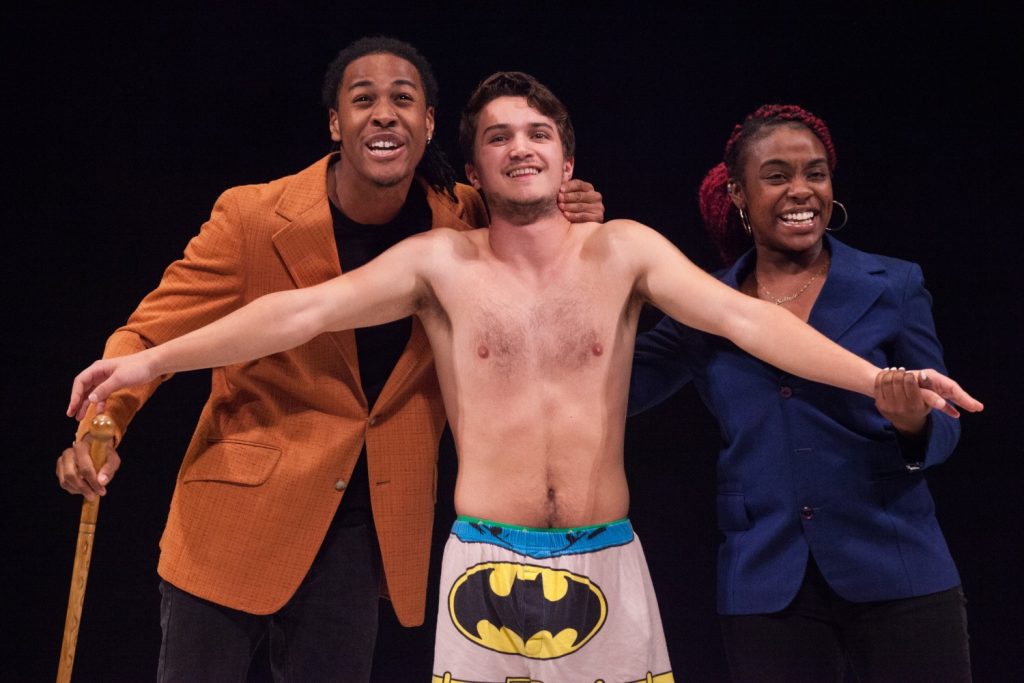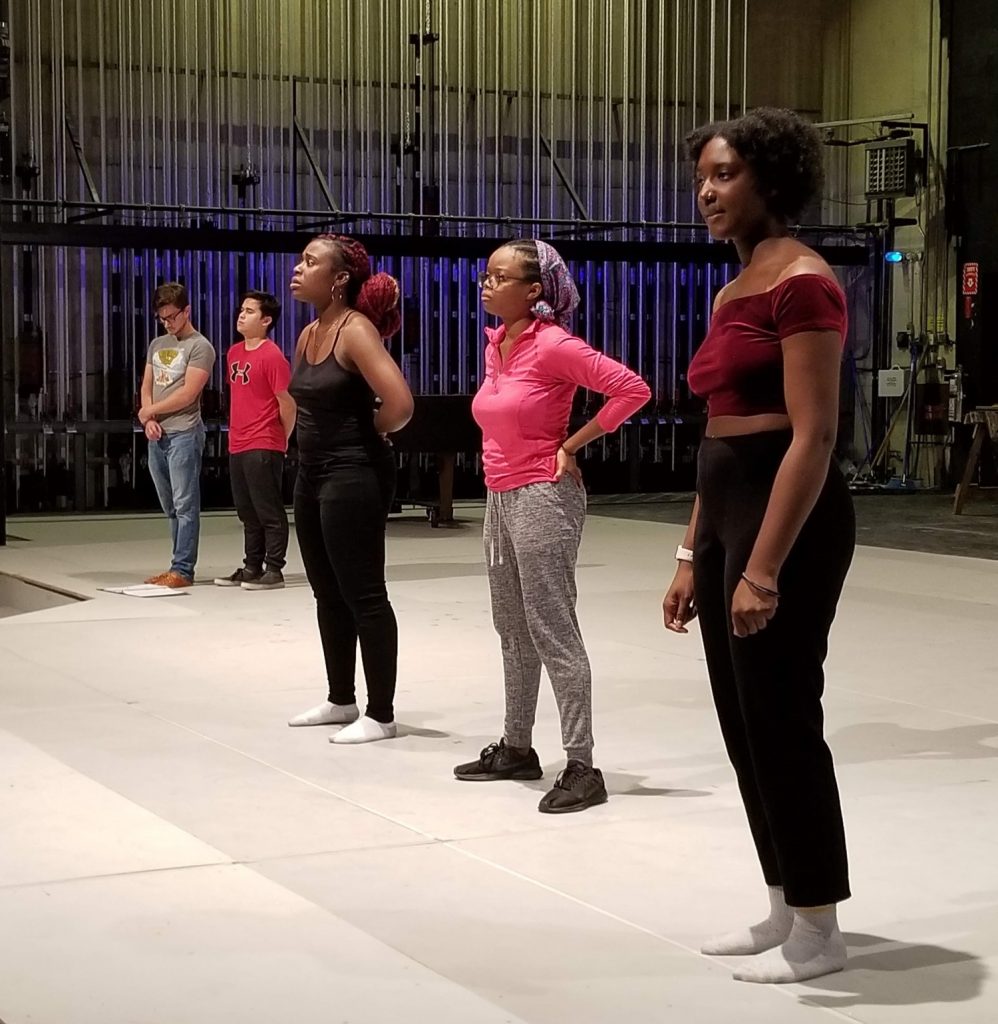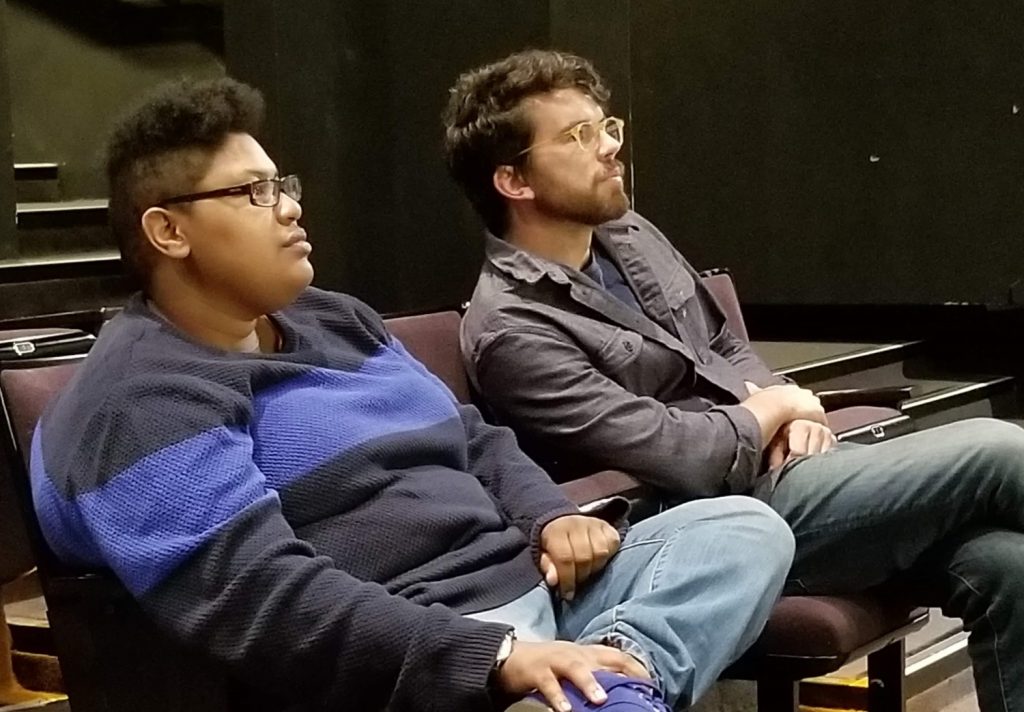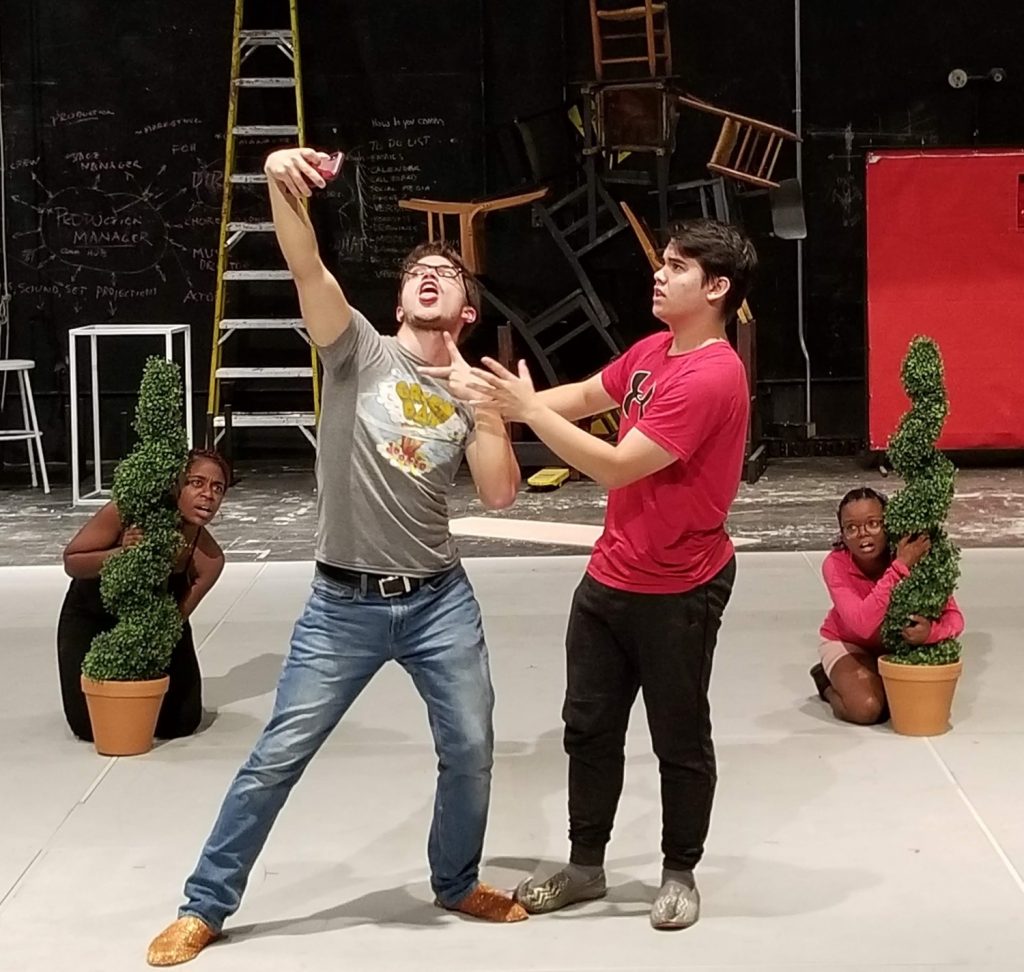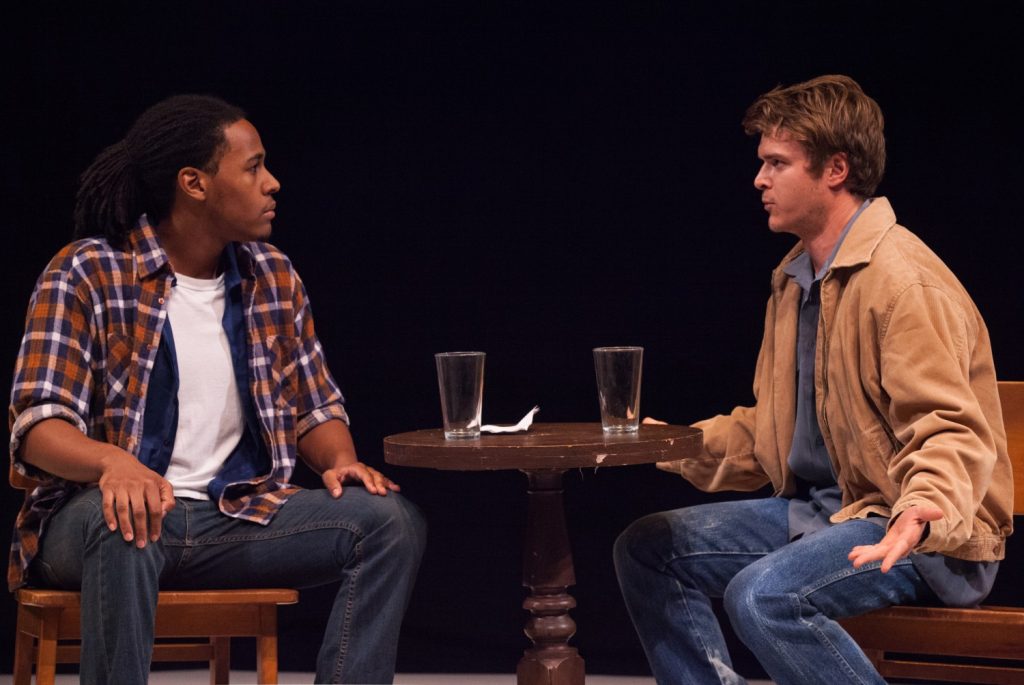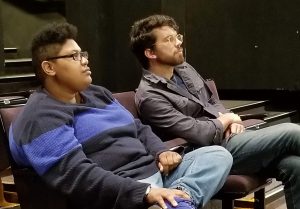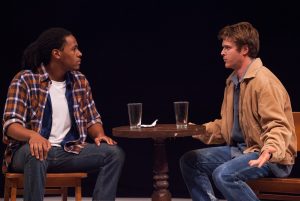“What am I bid for this fine specimen of white manhood?”
The swaggering black auctioneer scans the audience of prospective buyers, who quickly bid the price up, until the white man on the auction block goes to the jubilant winner for a fat five-figure sum.
This table-turning riff on an antebellum slave auction was part of the UMass Theater Department’s season kick-off event earlier this month. What’s noteworthy about this season is that, as theater professor Harley Erdman told me, “There are no canonical white male playwrights” in the mainstage lineup. In fact, three of the four plays are by and about people of color, and the fourth features a gender-fluid central character. In other words, this is not your granddad’s college theater.
Erdman said the department strives to be “conscientious about what’s taking place in the country and the world, serving our community with work that’s relevant, that reflects our ideals and aspirations.” The ability to even mount a season’s worth of shows with majority non-white casts is due in part to the department’s Multicultural Theater Certificate program, directed by Priscilla Page, which has attracted a lot of students of color as theater majors.
The kickoff event, in the campus’s Rand Theater, featured previews of the coming attractions along with shout-outs to the department’s course offerings, from movement and musical theater to sets and costumes.
The mock slave auction served as a thematic introduction to the season’s first production, opening this weekend. Snowflakes, or Rare White People, a satirical comedy by Manhattan-based playwright Dustin Chinn, was developed and workshopped last season in the department’s New Play Lab and is now receiving its world premiere.
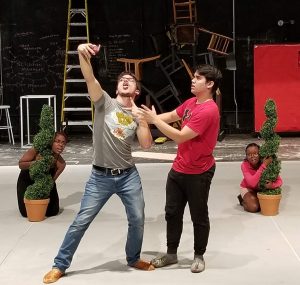 It begins with a deliciously unsettling premise, building on the demographic projection that before midcentury a majority of the U.S. population will be people of color. Extrapolate that shift out a couple hundred years and, in the playwright’s imagining, Caucasians are almost extinct. In this 23rd-century fantasy, humanity has evolved into a mixed-race multiculture and the country is governed by the Listen to Black Women Party, which has imposed “decades of sensible, boring, stable regulation and reform.”
It begins with a deliciously unsettling premise, building on the demographic projection that before midcentury a majority of the U.S. population will be people of color. Extrapolate that shift out a couple hundred years and, in the playwright’s imagining, Caucasians are almost extinct. In this 23rd-century fantasy, humanity has evolved into a mixed-race multiculture and the country is governed by the Listen to Black Women Party, which has imposed “decades of sensible, boring, stable regulation and reform.”
Remnants of the once-dominant white race are preserved on remote reservations and in Nueva New York, in the Museum of Natural History. There, in the Hall of Caucasian Peoples, two of them are exhibited as anthropological curiosities in a 1950s domestic habitat.
When the captive couple escape from the museum with the help of a white-obsessed curator, high levels of Caucasity are released on a public that hasn’t been subjected to it for generations. The show morphs into a madcap chase thriller, as the Caucasoids’ mere presence infects the outer world with microaggressions, unconscious entitlement, “irrational self-confidence” and cultural appropriation.
Snowflakes is a giddy, sassy, reverse-transgressive fun-house-mirror image of today’s society. The dark-skinned locals are both intrigued and fearful of the pale exotic fugitives, as officials from the Department of Fish, Wildlife and Ethnic Preservation try to recapture them and contain the toxicity levels.
The show is “hilarious, but maybe also uncomfortable,” said Tatiana Godfrey, the show’s dramaturg. “It’s about the ‘myth of whiteness’ and how it affects everything, from patriarchy and colonialism to museums – presenting a culture as an artifact.” (Indeed, in the real Museum of Natural History, the Hall of Asian Peoples is situated between the Hall of Asian Mammals and Birds of the World.)
UMass MFA candidate Gabriel Harrell is directing the show. The play’s themes are timely and topical, he said, citing the white male privilege on display in the recent Supreme Court confirmation hearings. (In Chinn’s future utopia, most of the characters holding power are female.) “These are not issues that we can often laugh at. There’s something about the comedy of this show that I hope will enable conversation that it’s difficult to have in our day-to-day lives. In reversing the paradigm, the script allows you to laugh, and then hopefully to talk to the person who’s sitting next to you.”
After the season kick-off, I sat in on a rehearsal of Snowflakes. The cast was working through a scene in which the white couple crash a traditional Indian wedding, observed with horrified fascination, from a safe distance, by the two officials pursuing them. They freely partake of the henna tattoos and ethnic food, claiming “a real connection to what’s happening here – an authentic cultural experience.”
During a break, I spoke with some of the cast members. I asked the actors of color what it’s like being the majority in a show, for a change.
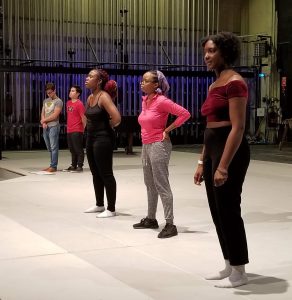 “It’s really beautiful,” Sabine Jacques enthused. “It’s a beautiful feeling to be in the majority on this stage, because we’re not often represented and I want to show representation for young black women and girls.”
“It’s really beautiful,” Sabine Jacques enthused. “It’s a beautiful feeling to be in the majority on this stage, because we’re not often represented and I want to show representation for young black women and girls.”
Taylor Mickens observed that while TV is getting “a little more open” for actors of color, positive roles are often given to light-skinned black women “and usually color blind. But in this show the roles are meant to be people of color because of the circumstances and the setting, so the fact that it’s majority people of color, and meant to be that way, is also breaking some boundaries.”
Nicholas Cummings plays one of the two white characters. I wondered what it’s like for him to be in the minority, for a change. “It’s been incredibly valuable to me, to just sit there and listen,” he said. “Everyone has heard the white guy’s story a million times, and to have an environment where other people can talk, and hearing everything they have to say, has really impacted me. I’m really grateful for that.”
In one of the play’s mirror-image turnabouts, one of the locals, curious about the white woman’s long straight hair, asks to touch it. “I’ve actually had that said to me,” Jacques remarked. ‘Can I touch your hair?’ A random white dude. You might not think you’re being racist but microaggressions are racist. I’m not a zoo animal.”
Referring to recent incidents of racial profiling and racist graffiti on the UMass campus, she continued, “As a black woman on a predominately white campus, these are things I’m constantly thinking about, and thinking about how, in this show, I can bring awareness to the white population about the struggle we’re going through.”
Akira Rose added, “So many white people on this campus don’t even know what’s going on. I can’t necessarily blame them, because they come from neighborhoods where they don’t have to interact with people of color. They’re used to seeing only themselves and what they see on TV, so they’ve never actually had to interact with real-life black or brown people. It’s really sad, because we all live in the same country and on the same campus. More than anything,” she said, the message of the play is this: “If I have to think about it on a daily basis, you’re going to have to think about it too.”
Snowflakes runs Oct. 25-27 and Nov. 1-3 in the Rand Theater at UMass. Tickets & info here.
It’s followed this semester by What of the Night? by Cuban-American playwright María Irene Fornés, a group of four related one-acts that explore the toll of poverty and the spirit to endure it. Later in the season, Lynn Nottage’s Pulitzer-Prize-winning Sweat looks at a working-class town devastated by deindustrialization.
The other entry in the season lineup is Wild Thing, a 17th-century Spanish play newly translated by Harley Erdman, who told me, “It deals with a female protagonist who identifies as a man.” While the original calls her simply a “mountain girl,” Erdman’s title underlines the character’s assertiveness and defiance, plus the fact that she’s “way ‘non-normative’ compared to any other dramatic character I’ve encountered from the time period.”
Photos by Carolyn Brown and Chris Rohmann
If you’d like to be notified of future posts, email StageStruck@crocker.com

